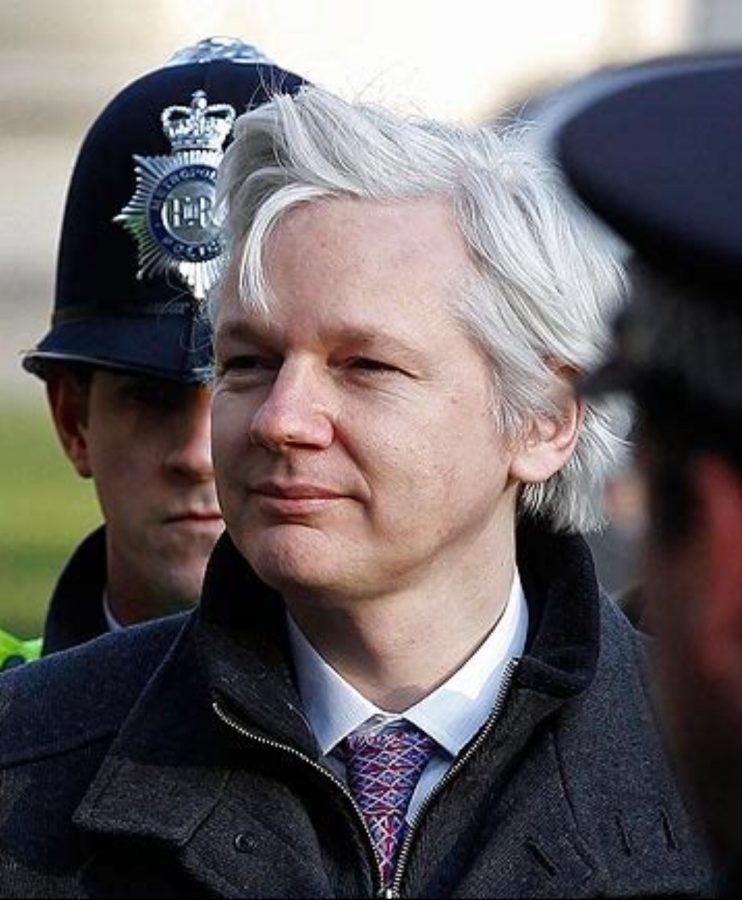Julian Assange Raid
September 6, 2019
On April 11, 2019, Julian Assange was arrested at the Ecuadorian embassy in London for “failing to surrender to the court.” On the 23rd of May, the US justice department filed 17 new charges against Assange for violating the espionage act.
Assange, founder of WikiLeaks, is currently being held at Belmarsh prison; the US wants to extradite him. Understanding the timeline of Assange’s time in the embassy is necessary to understanding what is currently happening.
In the year 2010, an arrest warrant was issued for Assange for an allegation of rape and an allegation of molestation after he visited Sweden. He feared that if he was extradited to Sweden, he would also be extradited to the US for charges over Wikileaks publications.
In 2012, Glenn Greenwald, a journalist, stated, “Both Britain and Sweden have steadfastly refused even to discuss any agreement that could safeguard both the rights of the complainants and Assange’s rights not to be imprisoned for basic journalism.”
In 2012, Rafael Correa, the then president of Ecuador, granted Assange asylum because the government believed that Assange would “become a victim of political persecution.” The government of Ecuador claims that, while Assange spent seven years in the embassy, he violated the terms of his asylum.
The embassy staff claimed that Assange skateboarded at night, played loud music, walked around without underwear, and smeared his feces on the wall. The current president of Ecuador, Lenin Moreno, called Assange a “spoiled brat.”
Rafael Correa stated that, while Assange did violate his terms of his asylum, “that’s no excuse for throwing him to the lions.” The president withdrew Assange’s asylum on April 11, 2019, leading to his arrest.
Some people have a positive view of Assange and see him as an important person who exposes the governments. Others are highly critical of Assange and think that he is narcissistic, disrespectful, and more of an activist than a journalist.
I interviewed a fellow senior for his opinion on Assange and the events that are currently happening. When asked about Assange, he stated, “I don’t really think Julian is a bad person for hacking or bad mouthing political figures or leaking info about other countries and what not, but if he actually committed the rape, I wouldn’t like him.”
When asked about the charges against Assange, he said, “I do think that the charges made against Assagne are justified. Not mentioning the rape allegations, I think the leaking charges are justified because they could potentially harm the US or other nations and thats not good.”
When asked about whether he thinks Assange should be extradited to the US, he stated, “I do think that Assange should be given to the US because he leaked info about the US. Since he was messing with the US I think it’s fair if he dealt with the consequences from the US.”
Finally, I told him that Assange’s lawyer, Jennifer Robinson, said that the extradition request would be a “dangerous precedent” where any journalist could face US charges for publishing “truthful information about the United States.” I asked him if he thought this was true and why.
He stated, “I think that it is true in a way. Since Assange posted ‘truthful’ information, regardless if was the right thing to do or not, he still went to London for asylum because he feared something would happen to him. So why would other reporters be safe and sound if they were to do something similar to what Julian did?”
The New York Times has an editorial that said that Assange has committed an “indisputable crime.” Ron Paul, an author and retired US politician, said that this editorial sounded “like a mouthpiece of the US government.”
Anna Ardin, one of the two accusers of Assange, expressed her opinion on what is happening. “I would be very surprised & sad if Julian is handed over to the US,” she stated in a tweet.
The 17 charges of the US government include One count of conspiracy to receive national defense information. The others include three counts of obtaining national defense information and 13 counts of disclosure of national defense information.
A Vox article states that “Prosecutors allege that Assange worked with Manning to hack a password on a Department of Defense computer to access classified government documents.” Greenwald and Micah Lee, a writer for The Intercept, states that the indictment “merely accused Assange of trying to help Manning avoid detection.” They add that this is “not ‘hacking.’”
Greenwald and Lee have stated that the US’ indictment of Assange is “a grave threat to press freedom.” The raid in the Embassy is very significant and will likely lead to interesting and important events in the future.
